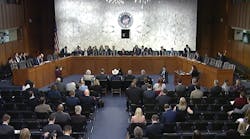Looking back on it, maybe Tuesday, Feb. 4 was not the best day for the U.S. Senate Commerce Subcommittee on Transportation and Safety to schedule a trucking safety hearing.
Taking place during the closing days of the impeachment trial of President Trump, hours before his State of the Union address and on the same day as the Iowa caucus, it is understandable why trucking safety issues were not top of mind for many on Capitol Hill.
The subcommittee hearing brought together several top industry representatives, a safety advocate and the law enforcement community before one of the subcommittees involved in helping draft a new highway funding bill to replace the FAST Act.
Numerous topics were discussed, from infrastructure funding and the DRIVE-Safe Act to distracted driving and drug testing. Yet, it is clear from the witnesses’ statements and accompanying written testimony provided to the subcommittee and posted online that the hours-of-service (HOS) rules remain a hot-button issue.
In opening the hearing, Sen. Deb Fischer (R-NE), chair of the subcommittee, said existing HOS rules are inflexible and “do not reflect real-world situations.”
The positions of American Trucking Associations (ATA) President and CEO Chris Spear and Owner-Operator Independent Drivers Association (OOIDA) Executive Vice President Lewie Pugh differed on many issues at the hearing. However, they each voiced strong support for the proposed HOS changes.
Last August, the Federal Motor Carrier Safety Administration (FMCSA) proposed five key changes to the HOS rules, including tweaks to the 30-minute rest break and allowing drivers to split the 10-hour required off-duty time into two periods.
Spear expressed optimism that FMCSA will move forward with a “common sense” final rule that better reflects reality.
“While HOS regulations are designed to provide the framework for the safe and efficient movement of goods, there has come to light the need for increased HOS flexibility to provide drivers the ability to adjust to changing road and weather conditions, congestion and sensitive truck loads,” Spear said in the written testimony.
He added the electronic logging device (ELD) mandate is helping regulators gather evidence to assure safety as FMCSA considers changes.
Though opposed to mandatory use of ELDs, Pugh said “hours-of-service rules are broken” and that OOIDA supports most of FMCSA’s proposal.
“Meaningful HOS reform will not only help the trucking industry and benefit highway safety, but can drive economic growth across the country,” Pugh said.
However, he warned that coercion of truck drivers from carriers, shippers and receivers has not been sufficiently addressed.
“Some of our members have never received a response to their complaint or have been told FMCSA had lost track of their submission. A lack of confidence in this system has discouraged drivers from reporting unsafe practices,” he wrote.
Sgt. John Samis, president of the Commercial Vehicle Safety Alliance (CVSA), took a more measured tone to the HOS debate.
Samis urged that changes “account for significant variances within segments of the industry, while keeping exemptions to a minimum, in order to ensure uniform enforcement.”
He raised concern that FMCSA’s previously issued guidance regarding personal conveyance “is incomplete because it does not provide a maximum distance and/or time that a driver can travel.” Allowing a driver to potentially drive several hours under this designation “presents the opportunity for increased driver fatigue and risk on our roadways,” Samis said.
CVSA recommended setting clear guidance, using Canada’s rule allowing drivers to use a vehicle for personal conveyance purposes for a maximum of about 46 miles as an example.
Pugh also called on Congress to address detention time and focus on the shortage of truck parking to boost safety. He said there were many positive safety steps in the FAST Act, but “there is more work to be done, as recent traffic fatality data reflects an upward trend in crashes and fatalities involving commercial motor vehicles.”
The increase in truck-involved fatalities was a frequent topic during the hearing.
“We can and must do better,” ranking member Sen. Tammy Duckworth (D-IL) declared in her opening statement.
These figures are among the reasons that HOS rules should not be “weakened,” according to Dawn King, president of the Truck Safety Coalition.
She said FMCSA’s proposed changes ignore “the effect that longer shifts have on injury risks and error rates” and allow more drivers to avoid using an ELD under the short-haul exemption.
So where does this leave things? Until FMCSA publishes a final rule or announces after reviewing public comments it has scrapped the proposal, it remains a waiting game.
But based on the long, rocky history of the HOS rule, the political divisions of our country and the strong emotions surrounding the issue, it is hard to see a way to avoid further court challenges before there is any resolution.
About the Author
Neil Abt
Neil Abt is a former FleetOwner editor who wrote for the publication from 2017 to 2020. He was editorial director from 2018 to 2020.
